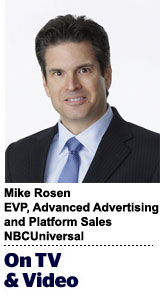 “On TV And Video” is a column exploring opportunities and challenges in advanced TV and video.
“On TV And Video” is a column exploring opportunities and challenges in advanced TV and video.
Today’s column is written by Mike Rosen, executive vice president of advanced advertising and platform sales at NBCUniversal Media.
Much has been written about the erosion of transparency and trust in the advertising ecosystem. The result is an existential threat to one of the most vital elements of our media marketplace: integrity.
For those of you rolling your eyes at the notion of integrity in the advertising trade, it is important to remember that integrity is an essential component of the business side of the marketplace in which I have proudly worked for the past three decades.
There are few outside the business of national TV who can fathom how billions of ad dollars are transacted – not on the back of a napkin, but during sleep-deprived, sushi-fueled, middle-of-the-night phone calls, all of which rely almost entirely on the word of each stakeholder.
Crazy? Yes. Healthy? Definitely not. Risky? It would seem so, except that it has worked for the last half century because everyone in the negotiation – on both sides of the table – shares a common purpose: to deliver effective solutions for marketers. If that trust breaks down, the whole business falls apart.
Those phone calls and face-to-face meetings nurture and build the trust that serves as the foundation of the TV advertising marketplace. Studies have shown that the level of a community’s ethics varies depending upon the quality of human contact therein. That is why, for instance, we tend to be more generous with tips and donations when there is direct human interaction between the giver and recipient.
So, it should be no surprise that individuals, whose identities are hidden behind the anonymity of the internet, sometimes behave in ways they would never consider if they were in view of their friends, family and co-workers. Yes, I’m referring to the trolls that have overtaken social media – but it also applies to the bad actors of the digital ad business that keeps those sites afloat.
The digital ad ecosystem is run by opaque, algorithmic media transactions. Trust has been sacrificed for convenience and, as a result, the integrity of the system is breaking down. It’s as if the industry has decided to buy a cheap Louis Vuitton bag at a flea market – odds are you’re getting a bag that’s poorly made, is falling apart and has branding that is probably misspelled.
What we buy is important, but so is how we buy it. There needs to be human, look-them-in-the-eye accountability in the digital ad business that is supported – not subjugated – by data and automation.
It’s time to shift our thinking back to “put the customer first” and not “buyer beware” because “algorithm” is not synonymous with “accountable.”
To bridge the transparency gap, integrity should come first with premium video companies. Everything they do and every innovation they apply should be in service to improving the quality of the advertising industry’s most valuable content experiences, for viewers, users, marketers and agencies alike.
In the programmatic digital world, that means offering all premium video in the pipeline, including full-episode player streams. That also means applying a unified auction to the bidding on that inventory, so that a programmatic buyer has the same opportunity as a direct buyer to secure the highest-quality content in the marketplace.
At the same time, premium video companies are applying advanced targeting and transactional automation to substantially improve the value of what they bring to market, without diminishing what has made their premium content so effective for advertisers in the first place. Television companies are seamlessly connecting rich client first-party and/or relevant third-party data to media investments, without the loss of fidelity that happens when data gets dumbed down through translation to generic surrogates like age and gender.
The advertising business is always evolving and embracing new technology to push the industry forward. But at the same time, we must never forget where we came from. Integrity will always be a more valuable tool than any algorithm.
Yes, computers can process data beyond any human capability, but only humans can make a promise – and keep it.
Follow NBCUniversal Media (@NBCUniversal) and AdExchanger (@adexchanger).
This post was syndicated from Ad Exchanger.

More Stories
Roblox Breaks Into Programmatic
Two new staff for StopPress
Inside Pinterest’s Mission to Take Over the Desert